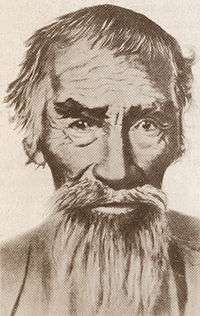Huarpe
The Huarpes or Warpes are an indigenous people of Argentina, living in the Cuyo region. Some scholars assume that in the Huarpe language, this word means "sandy ground,"[2] but according to Arte y Vocabulario de la lengua general del Reino de Chile, written by Andrés Febrés in Lima in 1765, the word Cuyo comes from Araucanian cuyum puulli, meaning "sandy land" or "desert country".[3]
 Member of the Milkayak Huarpe ethnicity | |
| Regions with significant populations | |
|---|---|
| 34,279 (2010)[1] | |
| Languages | |
| Spanish; formerly Quechua and Huarpe | |
| Religion | |
| traditional tribal religion | |
History
Huarpe people settled in permanent villages beginning in the 5th century CE. About 50 to 100 people lived in a village, making them smaller than Diaguita settlements. They were agrarian people who grew corn (Zea mays), beans, squash, and quinoa (Chenopodium quinoa).[4] Towards the 15th century, Huarpe territory expanded into the current Argentinian provinces of San Luis, Mendoza and San Juan and even on the north of the Neuquen Province. They inhabited between the Jáchal River at north, to the Diamante River at south and between the Andes and Conlara Valley on San Luis.[5] They were never fully part of the Incan Empire, but were influenced by Inca culture and adopted llama ranching and the Quechua language after 1480.[4]
Chilean encomenderos who had encomiendas in Cuyo introduced to Chile indigenous Huarpes, whom they hired to other Spaniards without encomiendas.[6]
Notes
- "Censo Nacional de Población, Hogares y Viviendas 2010: Resultados definitivos: Serie B No 2: Tomo 1" (PDF) (in Spanish). INDEC. p. 281. Archived from the original (PDF) on 8 December 2015. Retrieved 5 December 2015.
- Peoples of the Americas, Volume 1 By Patrick Gray. Marshall Cavendish, 1999. 1999. ISBN 9780761470519. Retrieved 2010-10-08.
- Oms, Andrés Febrés (1765). Arte de la lengua general del reyno de Chile: con un dialogo chileno-hispano ... By Andrés Febrés Oms. Retrieved 2010-10-08.
- Lewis 18
- Colonial Latin America, Volume 1 edited by Leslie Bethell. 1984-12-06. ISBN 9780521232234. Retrieved 2010-10-08.
- (in Spanish) Villalobos, Sergio; Silva, Osvaldo; Silva, Fernando and Estelle, Patricio. 1974. Historia De Chile. Editorial Universitaria, Chile. p 166–170.
References
- Lewis, Daniel K. The History of Argentina. New York: Palgrave MacMillan, 2001. ISBN 978-1-4039-6254-6.
External links
- Mendoza – History and Legends
- Huarpe People – Encyclopædia Britannica
- Discovery of a Fragment of the Printed Copy of the Work on the Millcayac ..., by Rodolfo R. Schuller
- Millcayac y Allentiac: Los dialectos del idioma Huarpe By Catalina Teresa Michieli – 1990
- (in Spanish) Information about the Huarpe culture
- (in Spanish) Web site about the Huarpe culture
- (in Spanish) Espejos culturales. Ethnography Map of the Huarpes territory.